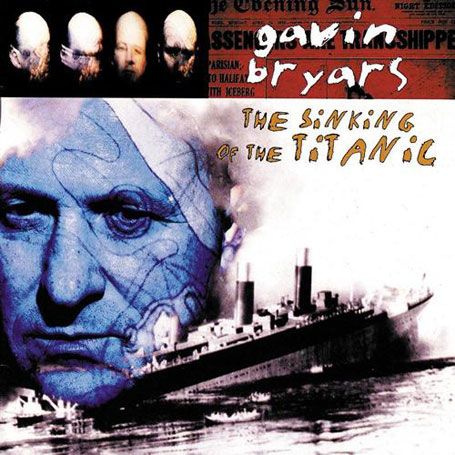

During my time here I read some truly amazing journals. Often these were only sporadically updated, but as they say, quantity above quality eh? What do you mean, other way around? Well anyway, one thing these journals shared in common was that on the rare occasion their authors chose to favour us with an entry, it was 100% brilliant and 100% worth waiting for.
But time has moved on, and some of these authors are no longer on the forum, or have abandoned their journals, with the result that they have slipped down the pages and can now be found gasping for air in the lower ranks of the section. This, to me, is not a good thing, and no way for such writing to be treated. So my plan is to descend into the bowels of the journals section and retrieve these gems, bring them back into the light for all to enjoy, perhaps for the first time, perhaps to remind you how great they were.
I make no claims about the music, much of which - possibly all of which, or most at best - is not for me. If it's your cup of cha, so much the better, but what I'm talking about here is the writing, which was always top-notch and on point. Journals need, in my opinion, to have three things going for them in order to be successful and interesting: a decent grasp of English, a true interest in and knowledge of the subject, and that old favourite, passion. Reading a journal without passion is really more like reading an old text book or manual, to me: if the writer doesn't show me he or she is interested in his or her subject, why should I be?
Needless to say, that does not apply to any of the journals I will feature here.
My original plan had been to pop a post in on these journals in order to raise them back up the ranks, but I'm not really sure that's my right, and I guess there may be some authors who would prefer their journals, for whatever reason, stay buried. So what I will do is post an extract from the journal in question and if you're intrigued you can follow the link to read more of it. Please note that due to the age of these journals, certain things such as videos and images may no longer work, but the writing is after all the thing.
If there's an old journal you'd like resurrected, and you either haven't the time or the patience to go searching for it, or if you only vaguely remember it, let me know and I will look for it. Criteria are simple: the journal in question must not have been updated for at least four years (this refers to an actual post by the author, not someone posting asking "are you ever gonna finish this" or something similar, and must be an actual post, not a "lol" etc sort of thing) and/or be on at least page six of the section. Or both.
**********************
First up is a man who may very well be still here, but if he is, I haven't seen him posting much. Anyone who has read his writing though will know this is more than worth a look. Hasn't been updated since 2016, but really 2013, so is currently languishing undeservedly on page 10. Here's the introduction:
Quote:
Originally Posted by Janszoon

25 Albums You Should Hear Before the Moon Crashes into the Earth and We All Die
This list is… well… basically exactly what the title says it is: twenty-five really good albums that I think are worth a listen, preferably sooner rather than later what with the lunar situation and all. That's not to say this the definitive list of my favorite twenty-five albums. Not at all. There's a lot I'm leaving off the list because I feel that they've already been discussed to death on MB or elsewhere, because I just don't think I have enough to say about them to warrant a write up, or because for whatever reason they just don't mesh with the whole Moon-crashing-into-the-Earth motif in my mind.
Anyway, on to the first entry...
|
And now here's a sample,
originally posted November 3 2012.
Quote:
Originally Posted by Janszoon

 1. Gavin Bryars—The Sinking of the Titanic (1990)
1. Gavin Bryars—The Sinking of the Titanic (1990)
Take one of those faint radio transmissions that flits through the weak atmosphere of Callisto and follow it backward through space and time. The frost-scarred surface of that Jovian moon recedes rapidly as the radio wave pulls you back toward its point of origin. For a moment Jupiter itself occupies your field of vision but then fades away as you fly through the void, past rock and ice, deep into the asteroid belt. The protoplanet Ceres, king of the asteroids, approaches from one side, but yet you are still pulled back. Back past the red ball of Mars, dusty and ancient. Back to the green and blue of Earth, the gray sphere of the Moon but kissing distance away. Down past dead satellites, through the cool damp mists of the atmosphere. Down, down, down toward green hills and roads in some remote part of the world. Down into the steel of a massive antenna, into wires that run deep underground, protected. Down the wires, through soil and minerals, to room in a bunker deep inside a mountain.
In that room is one solitary woman calmly loading and transmitting data—the sum total of all human knowledge and endeavor—deep into space in the hope that somehow, someday some remote civilization might detect these transmissions and learn something from them, or least know that they aren't alone. Around her are cluttered desks and abandoned chairs, evidence of her many colleagues, all of whom, as the end approaches, have abandoned their posts and run off to be with their loved ones or to dash through the hills naked or to drink themselves into a stupor. Not her though. She has stayed at her post, remaining calm and carrying on, one final reassuring vestige of normalcy in the face of destruction, like the ship's band that continued playing on the deck as the Titanic sank.
That immortal image of the band playing to the very end is what this final album, The Sinking of the Titanic by minimalist composer Gavin Bryars, is built around. His vision was of the band continuing on even as the ship slipped completely beneath the frigid waves of the North Atlantic, the notes of their songs echoing through the darkness of the water for the duration of their journey to the ocean floor. It has evolved significantly as a piece of music throughout its 40-plus years of existence, beginning life as a short open-ended piece written in 1969 and expanding both in scope and length in the following decades. It's been recorded multiple times: in 1975 for Brian Eno's Obscure Records label, in 1990 in a much longer form, and again in 2005 with avant-garde turntablist Philip Jeck.
It's the 1990 version that I'm discussing here. Robert Ballard's discovery of the long-missing wreck of the Titanic in 1986 had inspired in Bryars a desire to revisit and expand the piece and the result is really something to behold. Recorded live in the basement of an early nineteenth century Belgian water tower, the performance is an overwhelming experience of texture and mood. Mournful yet beautiful strings and horns fill the air with slow passages. Distant pinging and clanging echo around and around evoking twisting steel and dripping water deep in the bowels of the ship. Not quite discernible recordings of survivors' voices skip around in the shadows. And a boys' choir floats above it all like the spirits of the victims drifting up into the night sky.
This is not the kind of album you listen to casually, not something you throw on while you're cleaning the kitchen or going for a run. This is an album that's so emotional and so captivating that you just sit still and let it wash over you. From the clanging bell at the beginning to the fading notes at the end, it envelopes you in tragedy. The odd thing, though, about being so immersed in it, is that you begin to see other facets of those moments. The bravery and heroism. The sheer humanity. The cold beauty of waves and metal and stars.
For a moment the sky consuming mass of the Moon appears to just hang there, so close it seems that you could reach out and touch it. It looks different now in the reflected light of the Earth, no longer frozen and gray but warm and inviting. Those last few moments move with the pace of centuries as the world collectively closes its eyes and holds its breath. For a moment there is silence.
And then collision.
The ground buckles. Moondust rains down over the surface of the planet. The areas of the Earth's crust along the perimeter of the point of impact explode outward into space, trailing tails of magma in some synchronized cosmic ballet. The force of the event activates every volcano on the planet. Continents tear themselves to pieces. The seas boil. The atmosphere is ablaze. Every last flicker of life on Earth is extinguished. But rising out beyond the pandemonium at incredible speed are the last broadcasts of that lone woman in the chair. They race out across the solar system, carrying the final accounting of humanity—and of Earth—to places beyond. Past where we found them on Callisto, beyond the famous rings of Saturn and the less famous rings of Uranus, past the blue face of Neptune and the frozen wastes of Pluto, into the depths of space, toward some distant meeting with an unknown civilization, in an unknown time, in an unknown place.
|
And here's the link:
25 Albums You Should Hear Before the Moon Crashes into the Earth and We All Die